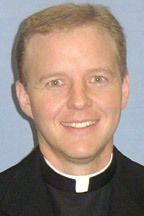
The Catechism of the Catholic Church calls the sacraments "the masterworks of God." (no. 1116) They are God's gift to his Church to share with his people the very grace of salvation.
Through the sacraments we receive the strength necessary for life in this world. By God's power we can more easily face the challenges of Christian witness and respond with heroic charity.
This is possible because of seven events in which God leaves his mark on our lives in the most profound ways. We cannot help but be changed when brushed by "the masterworks of God."
Many Catholics are quite familiar with the definition of sacraments as given in the Baltimore Catechism. "A sacrament is an outward sign instituted by Christ to give grace." The definition succinctly captures what really sets the life of a Catholic apart. There are a few ideas in that definition that bear further explanation.
First, a sacrament as an outward signs reflects the mystery of the Incarnation itself. By this mystery the unseen God took on the very real form of a human man.
Ordinary human life was forever transformed as Christ joined his divinity to our humanity. He shared the reality of our life so that we could share the divine life. In a like manner, and by Christ's design, the sacraments start with some of the most ordinary elements of human life.
Such material goods as bread and wine, as water and oil are transformed to convey something truly extraordinary. In the theology of the Church the sacraments depend on these specific materials just as Christ depended on real flesh and blood. The outward signs allow us to more easily connect the power of God to our daily lives just as the person of Jesus allows us to recognize God among us.
The second point is that each of the sacraments is an actual gift of Jesus himself. The Church did not create the sacraments but rather, received them from Jesus. It is important to consider the mind of Jesus and his mission from the Father. He knew that after the work of redemption he would give the task of evangelization and sanctification to his followers. He knew as well that they were incapable of this work alone.
Therefore, he gave them the Church by which his grace could come into the world and give true life to human worship and activity. As he lived and formed his Apostles he set apart certain actions that open the door to a deeper encounter with God. The Apostles came to understand these special actions as the seven sacraments of the Church.
The sacraments give grace. Grace is a gift of God in this world that allows us to share his divine life in the here and now, in preparation for the full sharing that comes in heaven. Grace is the very power of God that transforms our actions to more perfectly reflect God's presence within us. Because of grace the sacraments are alive with God and not merely reminders that he once worked for our salvation. For this reason we speak of the "real presence" of Christ in the sacraments.
It is important to remember that the sacraments are first of all about what God does for us, not what we do for God.
That distinction will explain to other denominations why we celebrate the way we do. For example, we baptize babies because of the grace for life that God offers the child. It is not necessary that the child be able to profess the faith because it is about what is received, more than what is given to God.
In each sacrament the generosity of God is displayed in his masterworks. Our part is to freely receive and be open to the transforming power of grace.
Father Erik Pohlmeier is the theological consultant for Arkansas Catholic and pastor at St. John the Baptist and St. Mary Churches in Hot Springs.
Please read our Comments Policy before posting.
Article comments powered by Disqus Don’t let misconceptions cause faith to waver
Don’t let misconceptions cause faith to waver
 Seniors, whatever storms may come, Jesus will be there
Seniors, whatever storms may come, Jesus will be there
 Studio 3:16 offers new approach to teaching religion
Studio 3:16 offers new approach to teaching religion
 After three decades, NLR principal plans to retire
After three decades, NLR principal plans to retire
 CHS athlete overcomes odds to reach collegiate goal
CHS athlete overcomes odds to reach collegiate goal
 St. Joseph a model of solidarity with immigrants
St. Joseph a model of solidarity with immigrants
 Two gifts after Jesus’ death: Virgin Mary and Eucharist
Two gifts after Jesus’ death: Virgin Mary and Eucharist
 Why we have an altar, and not just a communion table
Why we have an altar, and not just a communion table
 Pope: Wars should be resolved through nonviolence
Pope: Wars should be resolved through nonviolence
 Living relationship with Jesus Christ in the Eucharist
Living relationship with Jesus Christ in the Eucharist